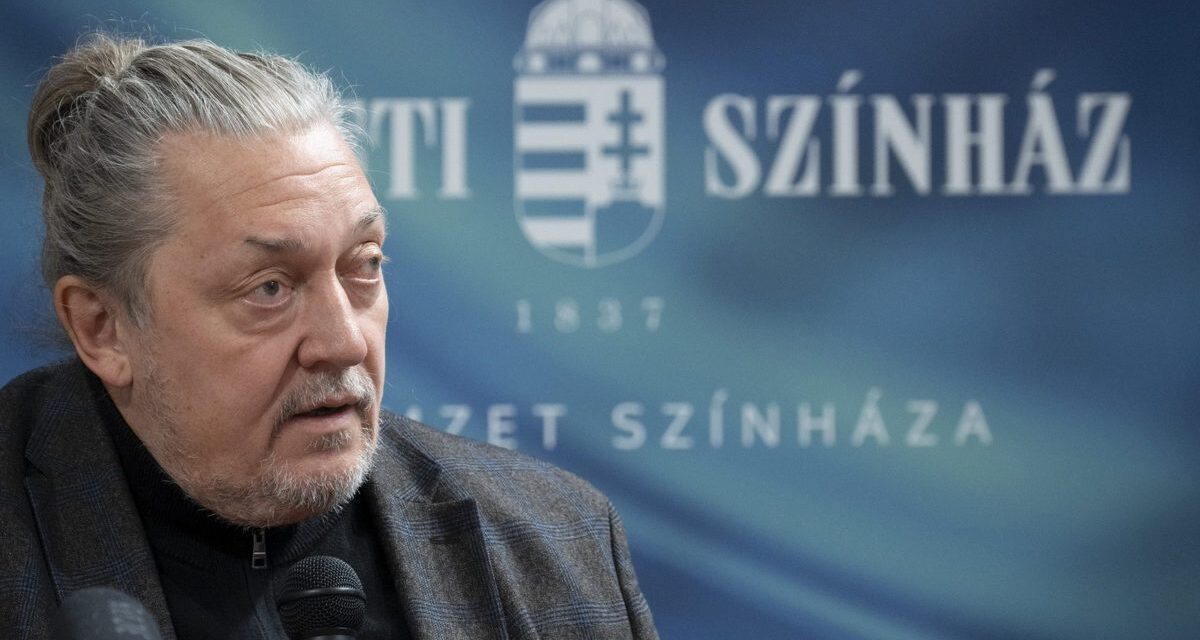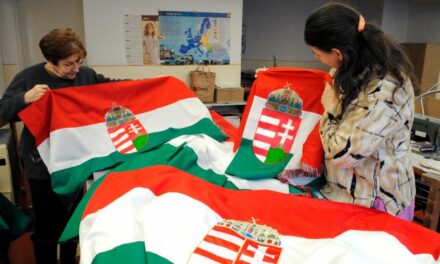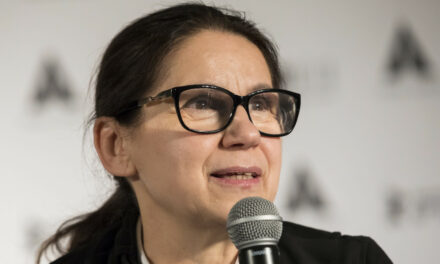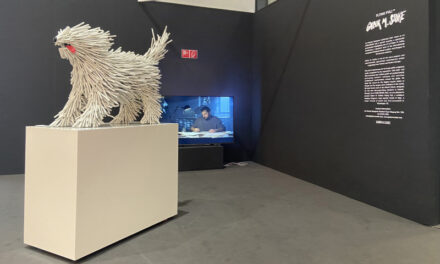"The whole thing in itself was not a surprise, it fits into a pattern," Attila Vidnyánszky tells Origo about the interview that Dorottya Udvaros gave to Márton Gulyás's Partizán, in which the actress criticizes the National Theater echoing untrue statements.
What was your first reaction when you watched the interview with Dorottya Udvaros on Partizán?
"I consider it essential or most important that Dorottya Udvaros signed the contract offered to her by the National Theater a few days ago, which I am of course happy about. Keep playing your roles.
Just like the actors contracted from the National - without exception. Since there was too much emotional "argument" in this Partizán discussion, I would rather stick to the facts. Interestingly, the self-proclaimed standard-setting press always highlights revelations like "I felt I already had things on my criminal record" and "I didn't have five stars on my certificate".
This is frivolous, or at least nothing more than creating a mood when a police investigation is underway, false claims are made about the compensation of the actors who suffered an accident, when Dorottya calls the internal investigation carried out by her own colleagues a "sham operation".
Let's face it, these aren't exactly collegial gestures. Just like the fact that he didn't come to the last two company meetings, it's difficult to carry on a dialogue about our theater community through the media. If that's the goal. But to answer your question: the whole interview itself was not surprising, it fits into a pattern.
Although it shocked even me, the deep hatred that could drive the presenter when he would squeeze out of Dorotty in a sweaty way one incriminating case of unacceptable behavior connected to me or the directors at the National Theatre.
Dorottya must try very hard to bring up some examples from my eleven years of operation. This desire to conform is incomprehensible to me only because its artistic quality would not justify this compulsion to conform."
Then let's talk about the facts! The accident in November came up again, when two actors from the Romeo and Juliet performance, Júlia Szász and Ottó Lajos Horváth, were seriously injured. What is the reality against the claims of the Partizán interview?
"Since I have been constantly informing the press about this - also in these columns - I am already aware that this is not about reality, but about narratives. You can easily and calmly avoid the facts, but I can't do that: just because of my responsibility as head of the institution, it's important to point out a few things again and again.
Of course, this won't change anything about the tendentious and manipulative setting in which Márton Gulyás, who socialized in Árpád Schilling's Chalk Circle, organizes his show, the facts don't really affect him. The way he conducted this conversation with the completely serious expression of "public service" certainly surpasses the performances of his directorial era. But the bottom line: while it is said in the interview that our two actors who suffered an accident have not received compensation to date, the fact is that since November they have each received more than five million forints - in addition to sick pay, under various legal titles. After the very unfortunate accident that occurred on Friday, we already transferred two months' salary to them on Monday, and we have continued to do so ever since.
Of course, compared to their claim for compensation, this is a much more modest amount, but the police investigation is still ongoing, the procedure is ongoing. In relation to the accident and the compensation of the two injured actors, it is important to state that, for example, the doctor can comment on whether their injuries are permanent after a year. Our goal is to agree with them. It is also not true that we do not acknowledge the fact of the industrial accident, we do not acknowledge that the theater bears sole responsibility.
If we establish exclusivity in such a case, it will be of precedential value. The actor also made a mistake here. Of course, the fact that we arbitrarily dismantled the set after the accident is also not correct, since we were just waiting for the expert opinion of the labor inspectorate, and after they allowed it - as it was considered legal after the seriousness of the injuries was determined - we dismantled it not that day, but the next day the scenery.
Side note, but the sentence that Dorottya generously attributed to me does not come from me, but from one of our actresses whom she also loves very much: the actor must learn the scenery. Dorottya puts this sentence into my mouth in such a way that she knows exactly who it actually comes from. Remember the wording is a beneficial obscurity, I don't want to involve him in this bad taste game, don't be dragged for his otherwise true statement.
A theater performance depicts life, and we have to learn about life. Life and theater are really a dangerous enterprise. Nowhere in the world are restrictions placed on orchestra pits either, but the heads of the institutions - for understandable reasons - still do not change. In the theater world, technical workers and actors constantly suffer minor or major injuries.
Dozens of things have happened in Hungary since our accident in November, some of which were also reported by the press. The National Theater, on the other hand, always gets an "honored" role, since it is an excellent way to feed the campaign against us by repeating inaccurate or outright false statements. There is tremendous hatred and anger on the other side, because the National Theater fulfills its role and is successful.
After the accident, many of our neighbors thought that everything would finally collapse, but we got back on our feet. We've had successful shows, and we've even completed our autumn premiere entitled Evening, which is created in collaboration with the Karaván Theater, the Hungarian National Dance Ensemble and the Capital City Circus.
He was not in a hurry to say that the musical piece based on the work of Tamás Szárka will be a great audience favorite. To describe the situation with three facts: the 2023-2024 season was mentally shaken, but of course the operation of the theater was also thoroughly disturbed by the accident, at the same time, with 120,000 spectators, 400 performances and 98 percent attendance, it is not very credible to say that the spectators did not they understand my poetic theater. This success angers certain circles, and since my appointment in 2013 we have been constantly in the crosshairs. Only the personalities of the characters participating in the campaign change."
It is suggested in the conversation that you retracted your resignation due to political pressure. This is true?
No political pressure played a role in my decision to remain the head of the National Theatre. I have always made free decisions about everything, otherwise I wouldn't be able to exist, I thought I had to continue working. The trauma brought on by the accident shocked me, and as a result I resigned, but after the first human gesture, I had to realize that I could not do this as the head of the institution: I had to lead the National from this difficult situation. There are a number of topics in Hungarian theater and cultural life, in connection with which my role, work, presence, and knowledge are important.
Finally, an attack surface set for aesthetics. It was again accused that, in addition to your poetic productions, the foreign directors invited to the National Theater are too expensive.
"If they didn't understand my arrangements, we wouldn't have hundreds of series. There are more than a hundred performances, including the stars of Egri, the Valiant soul, the brave János, the Tótek, but there was also huge interest in, for example, Romeo and Juliet. Do you have to get used to the poetic theater? This can be done by the circle that for decades did not allow any other way of speaking in this country besides German brain-bombing realist theater.
In addition, the poetic theater is not the imposition of some foreign principle on the Hungarian soul, which is also proven by the fact that even ordinary people tune in to it in seconds. But we can and the world is changing: the younger generation of directors is much more open. As for our theater's repertoire, of course we have less successful, harder-to-sell shows.
At my request, a colleague of mine conducted a research that looked at how often art theaters like ours change addresses. Although this comparison is difficult due to the different features, we are in a great position. Real theater involves risk, unlike theaters that build an alibi repertoire and operate with escapist titles, and it really happens that a painful decision has to be made and a performance has to be removed from the program.
During my eleven-year management, there were three such productions: two on the main stage and one studio performance. Compared to the nearly 100 presentations, this is a minuscule number. But we do everything we can to keep an aesthetically valuable but harder-to-sell big stage show alive. The mentioned production Krokodilus was really unable to appeal to the domestic audience, but as a Hungarian theater we performed this performance for the first time on the main stage of the Moscow Art Theater, accompanied by a standing ovation.
The performance of the Romanian star director Silviu Purcărete's Cherry Orchard was forced to stop due to covid. Among the foreign guest directors are Romanian, Russian, Norwegian, Spanish, Greek, Slovenian, Italian, Polish, Bulgarian, Belgian, Lithuanian - all of them could be important directors of any European theater season. For example, they help to open up the endlessly closed world of Hungarian theater, which would otherwise be stuck in the complacency of being "famous in Hungary".
The Madách International Theater Meeting (MITEM) also serves this purpose: our international presence is strengthened by guest directors and our own festival. Through them, we can make our voice heard in an environment where usually the spiritual message that we represent causes displeasure. Even in such headwinds, we managed to seriously position the National Theater abroad, and that is no small feat.
The performance of Rocco and his brothers mentioned by Dorottya: I put on this exciting theater experiment because it was written in such a modern theatrical language, attracting the interest of foreign theater professionals: it was not by chance that it became an argument for the organizing committee of the International Theater Olympiad.
After seeing our performance, they strengthened their determination to host the 10th Theater Olympiad under the leadership of the National Theater in Hungary. This was his most significant event in the world theater last year. In summary: the National Theater really works differently than a certain circle expects.
Not as a city theater, not to satisfy the needs of a narrow group, but as a theater that simultaneously keeps the great Hungarian classics in its repertoire, giving many, many young people the opportunity to get acquainted with these works, and at the same time we operate as a workshop with an innovative intention.
Twenty-two Hungarian and ten foreign pieces are currently in the repertoire. It's hard to pin it down to any title. We operate as an institution where 68 troupes were guests last year, and our own artists played in 69 places in Hungary, foreign territories and abroad. There is a constant presence of drama university students at the Nemzeti. The way the National Theater lives in the international space can only be compared to the most significant European theaters."
Photo: MTI/Zsolt Szigetváry












